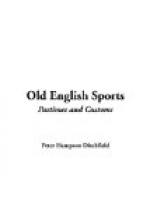CHAPTER IX.
SEPTEMBER.
“Nor is there hawk which
mantleth her on pearch,
Whether
high tow’ring or accoasting low,
But I the measure of
her flight do search,
And all
her prey, and all her diet know.”—SPENSER.
Hawking—Michaelmas—Bull and Bear-baiting.
Of all old English sports hawking is one of the most ancient and the most fashionable. It has almost died out now, but there are one or two hawking enthusiasts who have endeavoured to revive this old English pastime, and on the Berkshire Downs a hawking party was seen a few years ago. Hawking consists in the training and flying of hawks for the purpose of catching other birds. Kings and noblemen, barons and ladies of feudal times, used to delight in following the sport on horseback, and to watch their favourite birds towering high to gain the upward flights in order to swoop down upon some heron, crane, or wild duck, and bear it to the ground. Persons of high rank always carried their hawks with them wherever they went, and in old paintings the hawk upon the wrist of a portrait was the sign of noble birth. The sport was practised by our Saxon forefathers before the Normans came, and the first trained hawk in England is said to have been sent by St. Boniface, the “Apostle of the Germans,” as a present to Ethelbert, King of Kent, in the eighth century. The history of the sport of the kings who loved to take part in it, and of their adventures, would require a volume, and my space only allows me to give you a brief account of the manner in which the sport was conducted.
I may mention that before the reign of King John only kings and noblemen were allowed to take part in hawking; but in the forest Charter, which that monarch was compelled to sign, every freeman was permitted to have his own hawks and falcons. The falconer, who took care of the hawks, was a very important person. The chief falconer of the King of France received four thousand florins a year, besides a tax upon every hawk sold in the kingdom. The Welsh princes assigned the fourth place of honour in their courts to this officer; but this proud distinction had its responsibilities, and this high official was only allowed to take three draughts from his horn, lest his brain should not be as clear as it ought to be, and the precious birds might be neglected.
Sometimes the hawking party went on foot, carrying long poles to enable them to jump the ditches and to follow the course. Henry VIII. nearly lost his life on one occasion through falling (his pole having broken) into a bog, from which he was rescued by one John Moody, who happened to see the accident. But mounted on gallant steeds the lords and ladies were accustomed to follow their favourite pastime, and amid the blowing of horns and laughter and shoutings they rode along, galloping up-hill and down-hill, with their eyes fixed upon the birds, which were battling or chasing each other high overhead. The hawk did not always win the fight: sometimes a crafty heron would turn his long bill upwards just as the hawk was descending upon him, and pierce his antagonist through the body.




